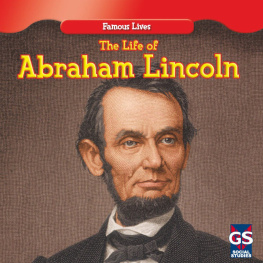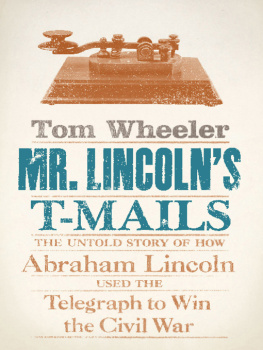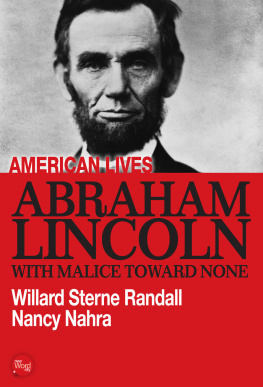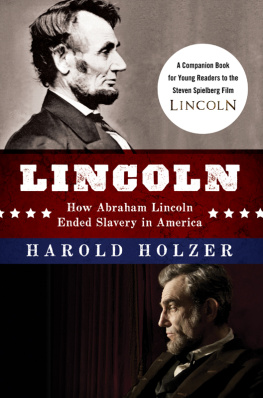Lincoln
MODERNITY AND POLITICAL THOUGHT
Series Editors: Morton Schoolman
State University of New York at Albany and
Kennan Ferguson
University of WisconsinMilwaukee
This unique collection of original studies of the great figures in the history of political and social thought critically examines their contributions to our understanding of modernity, its constitution, and the promise and problems latent within it. These works are written by some of the finest theorists of our time for scholars and students of the social sciences and humanities.
Titles in the Series
The Augustinian Imperative: A Reflection on the Politics of Morality by William E. Connolly
Emerson and Self-Reliance by George Kateb
Edmund Burke: Modernity, Politics, and Aesthetics by Stephen K. White Jean-Jacques Rousseau: The Politics of the Ordinary by Tracy B. Strong Michel Foucault and the Politics of Freedom by Thomas L. Dumm Reading Adam Smith: Desire, History, and Value by Michael J. Shapiro
Thomas Hobbes: Skepticism, Individuality, and Chastened Politics by Richard E. Flathman
Thoreaus Nature: Ethics, Politics, and the Wild by Jane Bennett
G. W. F. Hegel: Modernity and Politics by Fred R. Dallmayr
The Reluctant Modernism of Hannah Arendt by Seyla Benhabib William James: Politics in the Pluriverse by Kennan Ferguson
Merleau-Ponty and Modern Politics after Anti-Humanism by Diana Coole Aquinas and Modernity: The Lost Promise of Natural Law by Shadia Drury Carl Schmitt and the Intensification of Politics by Kam Shapiro
Impressions of Hume: Cinematic Thinking and the Politics of Discontinuity by Davide Pangia
Publius and Political Imagination by Jason Frank
Lincoln: The Ambiguous Icon by Steven Johnston
Lincoln
The Ambiguous Icon
Steven Johnston
ROWMAN & LITTLEFIELD
Lanham Boulder New York London
Published by Rowman & Littlefield
An imprint of The Rowman & Littlefield Publishing Group, Inc.
4501 Forbes Boulevard, Suite 200, Lanham, Maryland 20706
www.rowman.com
Unit A, Whitacre Mews, 26-34 Stannary Street, London SE11 4AB
Copyright 2018 by The Rowman & Littlefield Publishing Group, Inc.
All rights reserved . No part of this book may be reproduced in any form or by any electronic or mechanical means, including information storage and retrieval systems, without written permission from the publisher, except by a reviewer who may quote passages in a review.
British Library Cataloguing in Publication Information Available
Library of Congress Cataloging-in-Publication Data
Names: Johnston, Steven, author.
Title: Abraham Lincoln : the ambiguous icon / Steven Johnston.
Description: Lanham : Rowman & Littlefield, 2018. | Series: Modernity and political thought | Includes bibliographical references and index.
Identifiers: LCCN 2018010307 (print) | LCCN 2018011362 (ebook) | ISBN 9781442261310 (Electronic) | ISBN 9781442261303 (cloth : alk. paper) | ISBN 9781442261310 (electronic : alk. paper)
Subjects: LCSH: Lincoln, Abraham, 18091865Philosophy. | Lincoln, Abraham, 18091865Political and social views. | PresidentsUnited StatesBiography.
Classification: LCC E457.2 (ebook) | LCC E457.2 .J64 2018 (print) | DDC 973.7092dc23
LC record available at https://lccn.loc.gov/2018010307
 The paper used in this publication meets the minimum requirements of American National Standard for Information SciencesPermanence of Paper for Printed Library Materials, ANSI/NISO Z39.48-1992.
The paper used in this publication meets the minimum requirements of American National Standard for Information SciencesPermanence of Paper for Printed Library Materials, ANSI/NISO Z39.48-1992.
Printed in the United States of America
History is not the past. It is the present. We carry our history with us. We are our history. If we pretend otherwise, we literally become criminals.
James Baldwin
Series Editors Introduction
Steven Johnstons book is the nineteenth volume in Modernity and Political Thought (MPT), the Rowman & Littlefield series in contemporary political theory. It follows the publication of recent MPT volumes on John Rawls by J. Donald Moon, Publius by Jason Frank, David Hume by Davide Panagia, Carl Schmitt by Kam Shapiro, and Gilles Deleuze by Nicholas Tampio. Planned volumes beyond these include works on Paul by Char Roone Miller, Friedrich Nietzsche by David Owen, and Edward Said by Jeanne Morefield. MPT has long served as a series that both reintroduces and refigures important and canonical political theorists and philosophers in relation to the politics of our modern world and includes works by distinguished political thinkers of today. Previous volumes have focused on Augustine (William Connolly), Hobbes (Richard Flathman), Burke (Stephen White), Emerson (George Kateb), Rousseau (Tracy Strong), Thoreau (Jane Bennett), Adam Smith (Michael Shapiro), Foucault (Thomas Dumm), Hegel (Fred Dallmayr), Arendt (Seyla Benhabib), William James (Kennan Ferguson), Merleau-Ponty (Diana Coole), and Aquinas (Shadia Drury).
Each study has proposed critical interpretations and arguments about key figures in the history of political theory, figuring their importance in the structure of modernity. Contributors to Modernity and Political Thought critically examine ways in which major political theorists shape our understanding of modernitynot only its origins and constitution but also its overt and latent problems, promises, and dangers. In addition to the works themselves, the series illustrates how the history of political thought can be brought to bear on modernitys political present to acquire deeper insight into its possible political futures. As a whole, MPT offers an unparalleled presentation of the discussions and debates that define much of political theory today.
Steven Johnstons analysis of American politics has made him an important democratic theorist of our time. In Lincoln: The Ambiguous Icon , Johnston takes on one of the arguably most significant and controversial figures in U.S. history. In his many books in political theory, Johnston has engaged the various dynamics of the democratic polity: nationalism, memorialization, violence, patriotism, and, above all, tragedy. For Johnston, the genre of tragedy best explains the particular crux in which modern thought finds itself. Constantly looking for a clear path forward, it finds instead diverging, opposed, and contradictory ethical and moral choices. Out of this thicket of competing claims, no singular and absolute political solution can or should be found.
Tragedy forms the groundwork of politics, Johnston has long held, though many in the contemporary world (especially in the United States) instead assume a progressive teleology of resolution and improvement, or, conversely, a consistent and lamentable decline. Though it is grounded in Greek theater, tragedy proves to be the most modern of genres. Politics is always a clash, most often between sides that see themselves as driven by truth, morality, and historical destiny. As such, it will always contain an agonistic element as its very fundament, and those ideological apparatuses and national myths that attempt to deny these intrinsic antagonisms of politics will be ineluctably drawn into numerous cruelties and violences in their attempt to insist on unity. The gift of tragedy, at least formally, is its ability to dramatize the irrevocability and irreconcilability of critical situations. Its protagonists, caught between fate and law, or between competing moralities, or between order and family, cannot escape; while they may never realize the consequences of the decisions they make trying to resolve the irresolvable, the audience can. Tragedy shows that there may be no perfect solution, no easy way out. It therefore realizes contradiction and demands attention to the practices and consequences of refusing to believe in the tragic condition of humanity.
Next page









 The paper used in this publication meets the minimum requirements of American National Standard for Information SciencesPermanence of Paper for Printed Library Materials, ANSI/NISO Z39.48-1992.
The paper used in this publication meets the minimum requirements of American National Standard for Information SciencesPermanence of Paper for Printed Library Materials, ANSI/NISO Z39.48-1992.